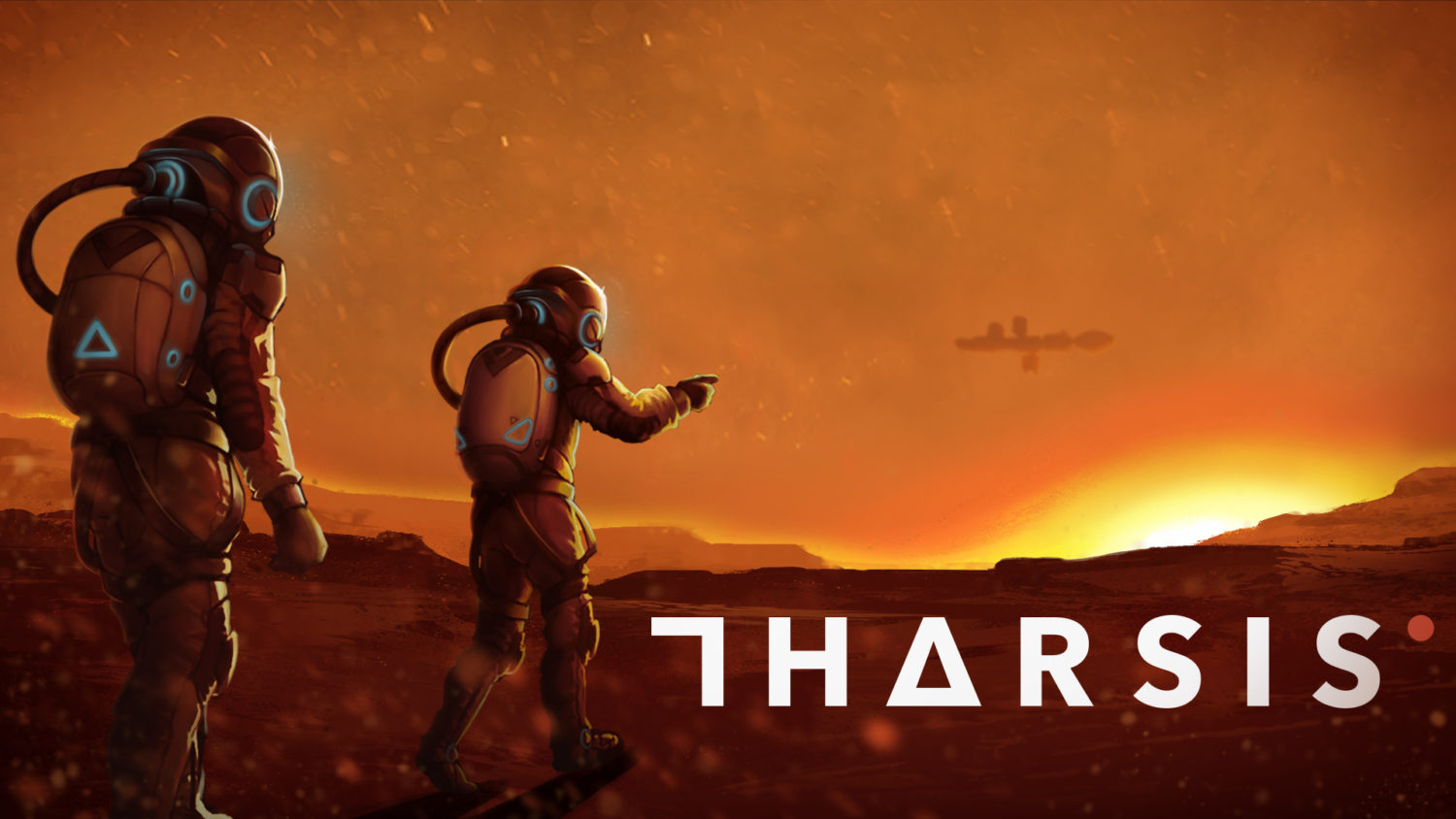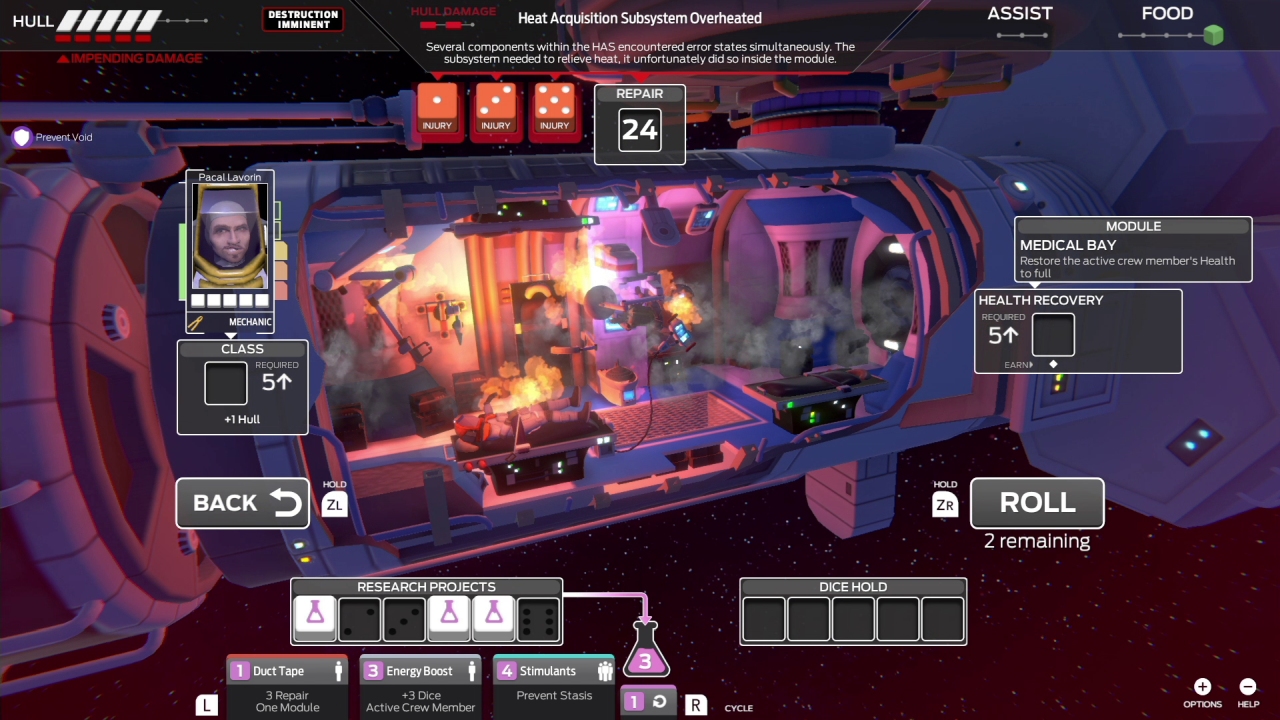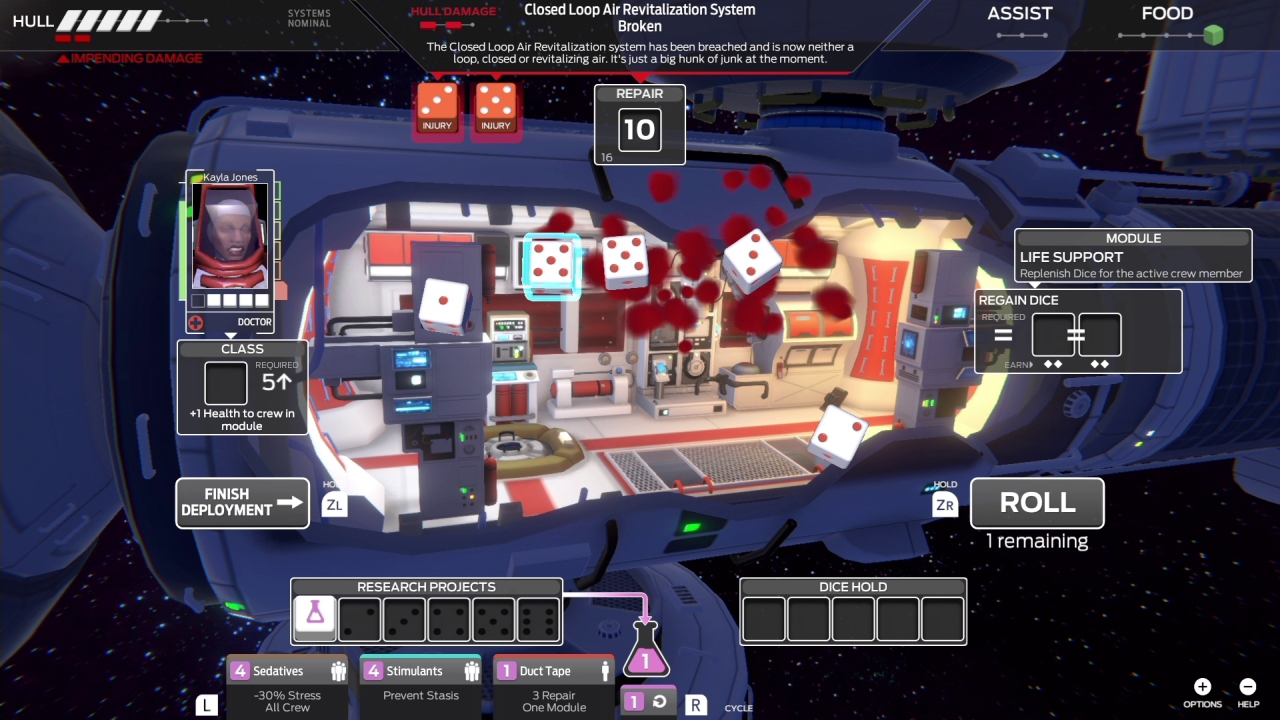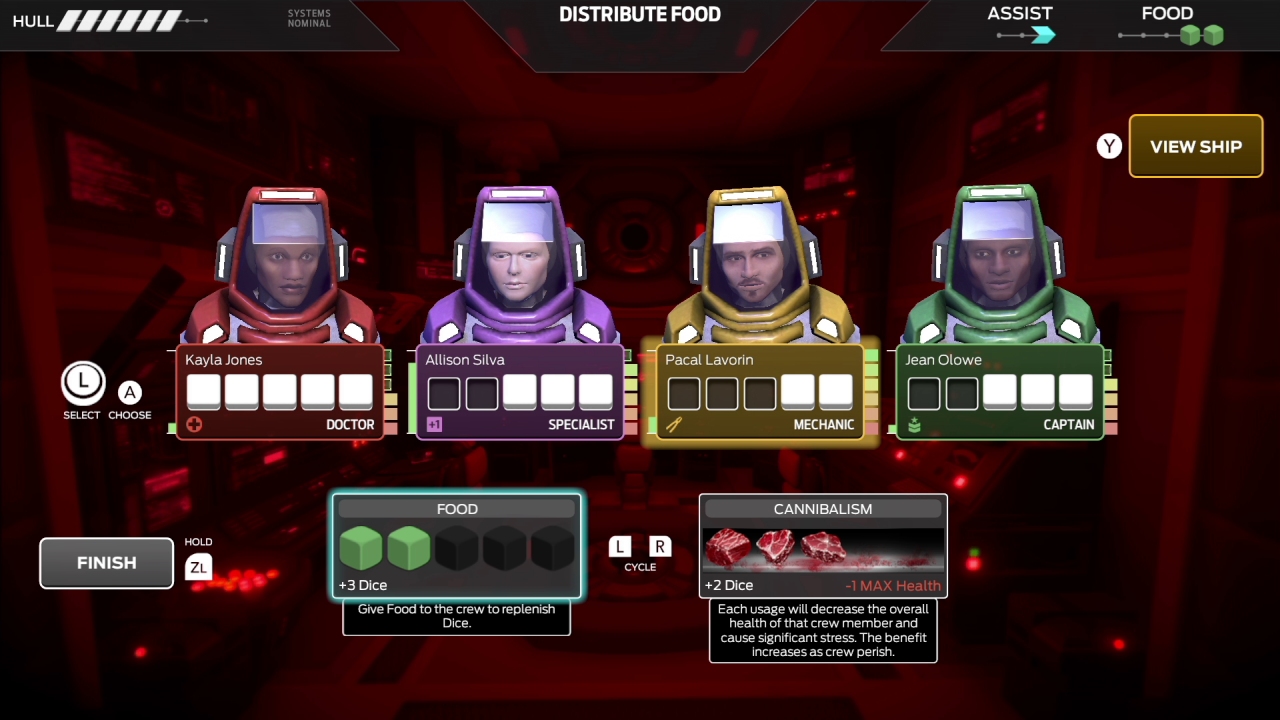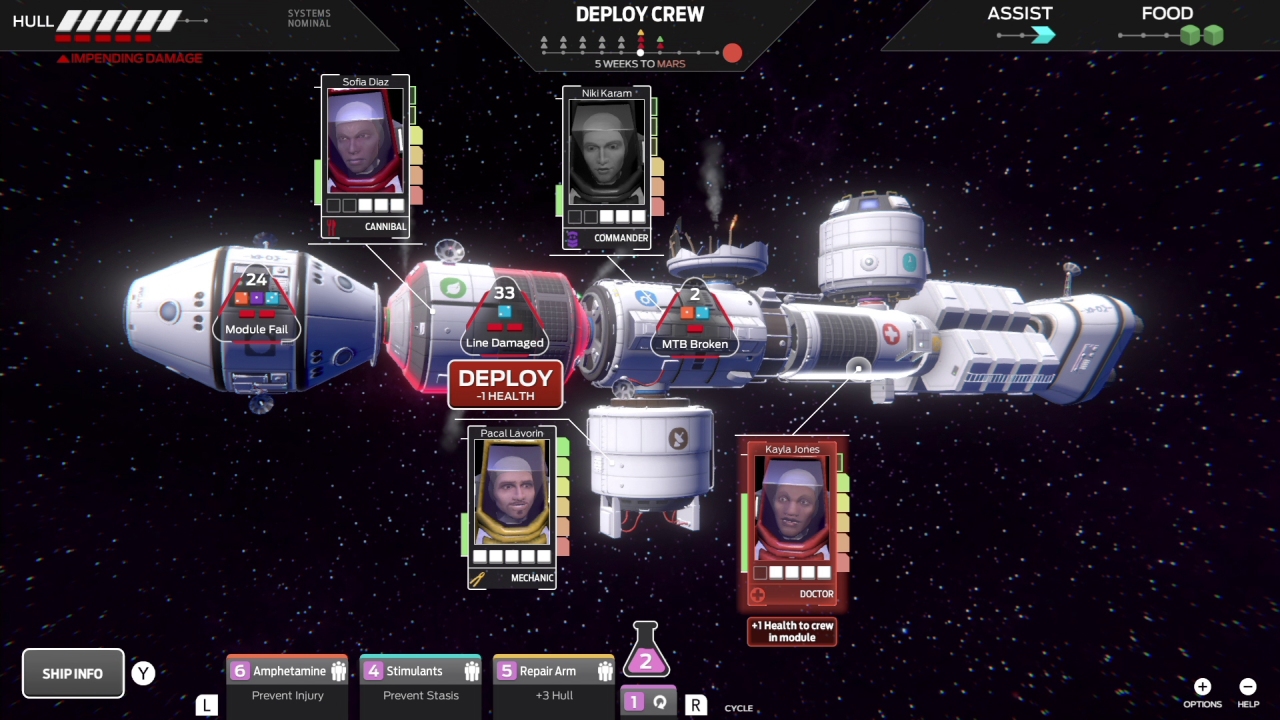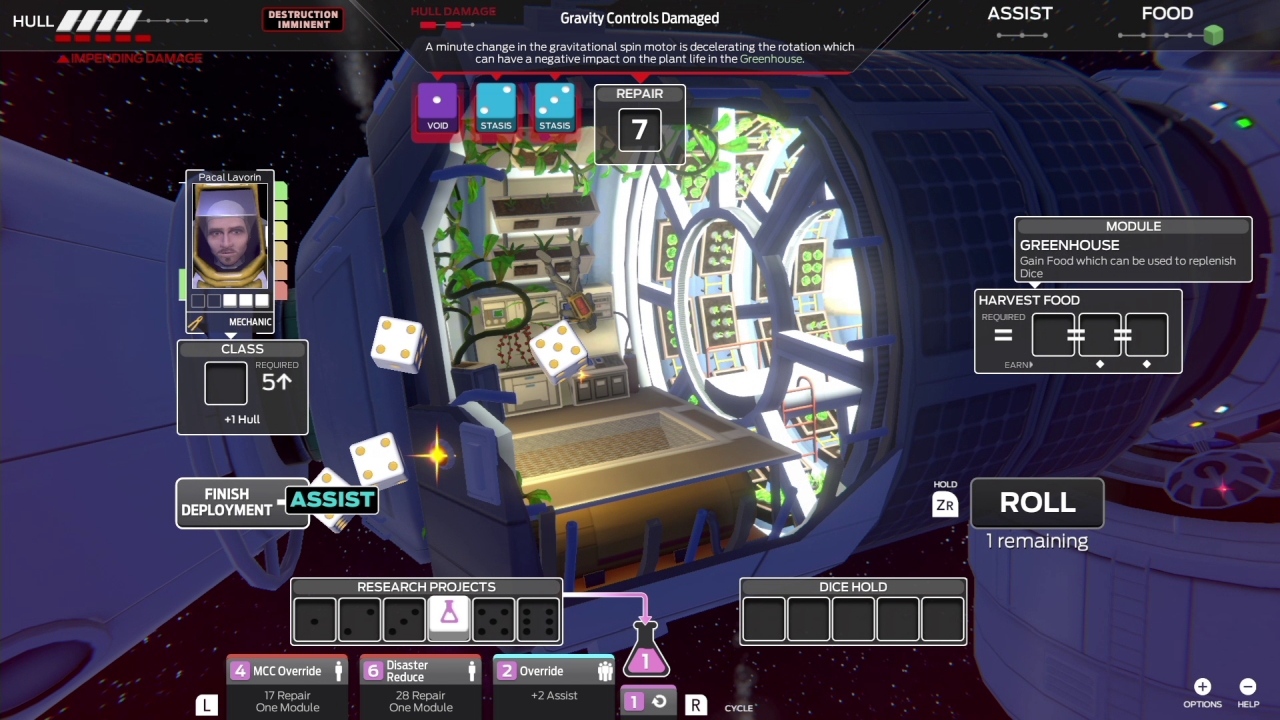A 10-round roulette wheel of no fun.
Dad: OK kids, hop in the spacestationwagon. We’re going to Mars!
Jr: I call tailgunner seat!
Mom: Just make sure you have your seat belt buckled and your spacesuit helmet is on tight.
OK, so Tharsis isn’t exactly a family road trip; there are no roads and it isn’t family friendly, so what is it? Let’s have a nice family meeting to discuss it.
Before we get into the details, I’ll throw this out for you—this game is very hard to read if you play it handheld mode. There is enough tiny text and detail that using your TV is highly recommended.
Tharsis is a mission-to-Mars game. You need to direct the actions of four crew members aboard your spacecraft so you can land at least one person alive on Mars. I would say “safely” on Mars, but this voyage isn’t exactly OSHA approved. In the opening scene, you get hit with the wonderful news that your crew of six (you read that right…) has encountered a disaster and your food pantry has basically blown up. You have lost two of your crewmates; one’s lost to the void of space, the other is in a body bag still aboard the ship. This scenario is not so unusual for a survival themed game, so onward we go.
Next, we encounter more problems. These come in the form of everything from electrical glitches, micrometeorite strikes, hull damage, radio failure, and TPS report problems (if this is the nod it seems to be, nice touch!). To fix these myriad issues, you need to deploy a member of your crew to the location indicated and start rolling the virtual dice.
The damage is assigned a number value, and the dice you roll need to total up to at least that number to complete the repair. You can deploy more than one crew member to a problem, so don’t panic just yet, there will be plenty of time for that later. Once you roll your dice, you can assign them to repair damage, do “research,” repair hull damage, or buff stats. So, research got the quotes thing because you are not really doing research (no surprise), but the points you add to the research tray can earn a variety of special actions including repairs. This is good to keep your eyes on it because it can save your bacon.
Let’s talk about the bacon, or, more precisely, food. Yes, you need to try to maintain the module which is growing your food supply and allocate dice to harvesting your crops. If that source of nutrition is too slow to produce, there is the option of cannibalism. You do have one dead crewman already at the start of the game so…
If you decide to engage in cannibalism in the game your crew will experience an increased stress level. Higher stress means more reckless suggestions. This can lead to more crew members dying, but then that’s more food, right? The game even offers this as a suggestion to increase your food supply—intentionally killing off one crewman to feed the remaining crew. Here’s a note to the game developers: unless we’re playing a zombie apocalypse game, and we all like destroying zombies, leave cannibalism out! This is just a cheap shock tactic to cover up poorly constructed storylines, plots, or gameplay. If you can’t come up with a better way to get around feeding your crew, go back and do another brainstorming session (take the zombie pun there if you like…braaaaaaaiiins).
Another fun feature is the between rounds special project. This is another randomly generated condition which requires a decision. It may be deciding to balance rest (which reduces crew stress) with getting work done (which keeps the ship intact). There are lots of trade-offs in the game, and you need to balance crew health, stress levels, repairs priority, dice allocation points, and so on.
In theory, this should be a good resource management and planning/execution game. The downside is that too much of the game is based on a random number generator. There is some strategy involved, but good planning only goes so far when you have an unreliable and randomly shifting set of resources. The game will even randomly assign how many dice each crew member starts with so you could be handicapped right from the start—or not. Who knows? It’s just random.
The dice rolls are random, of course, so you may not like what you get. However, you do get two rolls per deployment, so you may not be completely stuck unless the game throws more of its little nuggets of joy your way. Conditions such as stasis (this locks the value, no re-roll for that die), void (this die disappears), and damage will affect your roll. What is damage, you ask? More random conditions are generated with each deployment, so if the game decides that a roll of 4 means damage then your crewman will take one point of damage for every die which has a 4 when you roll. As with too many elements of this game, this is random.
If you haven’t noticed yet, I’m not exactly thrilled with how many things in this game are based on randomness. The random selections include how many damage points the ship takes in a turn, what type of damage is dealt, how many points of damage are assigned to each location, how many dice each crewman starts with, and so on. Don’t get me wrong, I’m not anti-random or dice phobic; I have been both player and DM in a fair few campaigns of D&D, and we all know that means lots of dice. The big problem is how randomness is used in this game.
The basic premise of Tharsis is interesting, the visuals are good, and the mechanics sounded promising. What I encountered while playing is a short, 10-round roulette wheel of no fun. There are some suggestions on the game site and I have tried them—delaying nonessential repairs, stacking crew in modules to take advantage of buffs, etc.—but the too-random nature of the game sucks the fun out of it. This game becomes less of how you do things and more of just what the dice do. There are three difficulty levels so it will test your skill, if not your patience, for a while.
Review: Tharsis (Nintendo Switch)
Average
There would be a good story to be had if Tharsis was developed to involve more than just trying to survive a few rounds. The theme of surviving on a spaceship and figuring out how to keep everything—and everyone—together should make for a good game. Unfortunately, Tharsis fails on too many points to be really worth playing.

